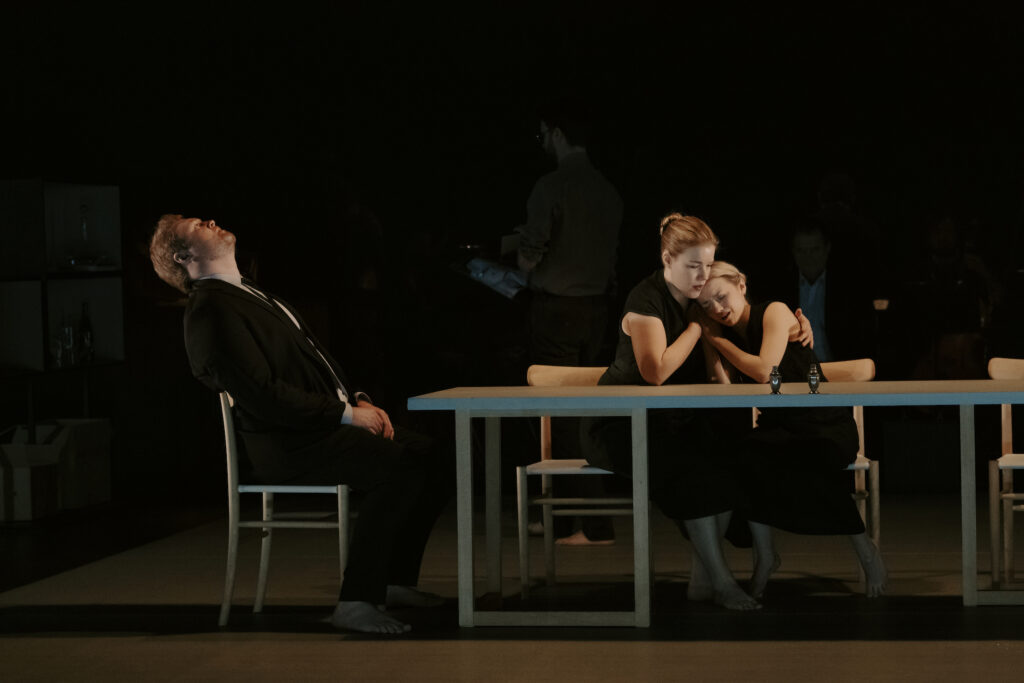Some years ago British stage director Katie Mitchell, with French early music conductor Raphaël Pichon concocted a dramatic action based on fragments of cantatas by J.S. Bach for the Aix Festival. Here it was again, in Lyon’s historic, spoken word Théâtre des Célestins (above photo).
In Aix, at the time, Trauernacht (Night of Mourning) seemed to be a mere requiem mass for a dead pater familias, his four children gathered around a dining table to recount their reactions to his death, recognizing that he, as all men, was a sinner, his children ultimately finding solace knowing that the father, redeemed, would now bask under the gaze of God.
As part of the Opéra de Lyon’s themed (family secrets) winter festival, Trauernacht has taken on an added dramatic dimension. it has become the moment of revelation of the fathers secrets that have affected the lives of his children (though we are not told what or how). Its abstract action recounts the recognition by each child of the father’s transgressions, and charts their forgiveness (or lack of) of these revealed sins.
It is a quite subtle dramatic action.
Over the years stage director Mitchell distinguished herself at the Aix Festival for her stagings of family dramas, many — yes, most — of her stagings were at a dining table. It was no surprise that she set Trauernacht at a table where a soprano, alto, tenor and bass come to grips, again now in Lyon, with the death of their father. Dinner is three full courses, with digestif. It was a long evening.

The four singers, simply and somberly clothed, sit at the table on four chairs. There was a fifth unoccupied chair where the dead father would finally sit, mostly he remained upstage, a phantom, his presence marked occasionally by his eerie whistling. The four singers had mastered slow motion movement in order to move, eerily, to and from the table to the serving shelves at the edges of the stage without disturbing the almost beat-less flow of the music.
These artificial movements, butoh-like, were quite extended. The singers were barefoot. With such staging the result was certainly more oratorio than opera (oratorio is un-staged opera on a sacred theme).
Like at the Aix premiere in 2014 the four voices were entrusted to singers in the companies’ young artist programs. The players in the 11 person orchestra in Aix were a part of the Aix Festival’s summer academy, and in Lyon the players were from the Conservatoire National Supérieur de Musique.
Trauernacht is a collection of four choruses, five recitatives and five arias (ranging between BWV 46 and BWV 668) from among Bach’s 200 cantatas. There is as well an initial a cappella motet composed by Johann Christof Bach that calls our attention to the requiem mass that was to unfold.
Within the context of the themed Lyon winter festival the dramatic charge was more interesting in Lyon than it had been in Aix, and indeed there were some moments when Bach’s music was propelled into celestial spheres. Like in Aix however, the evening in its totality remained a tedious exposition of antique four-part harmony.
Michael Milenski
Soprano: Elisabeth Boudreault; Mezzo-soprano: Fiona McGown; Ténor: Andrew Henley; Baryton: Romain Bockler; The Father: Philippe Dusigne. Musiciens du département de musique ancienne du CNSMD de Lyon. Conductor: Simon-Pierre Bestion; Stage direction: Katie Mitchell realized by Robin Tebbutt; Sets and Costumes: Vicki Mortimer; Lighting; James Farncombe. Théâtre des Célestins, Lyon, France, March 19, 2022.